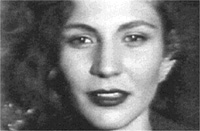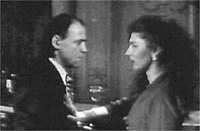SD: No, not all of them. The one in the bar was. Mostly there were inner thoughts, which were largely an amalgam of sentences I had underlined in a book by Peter, Le poids du monde,[2] which Wim had asked me to read. And when I read it, I underlined the sentences that made the biggest impression on me. So a number of lines come from that book. If you ever read it, you'll see what I mean. For example: "Se regarder dans un photomaton et il en sort une image avec un autre visage." All the inner thoughts in the trailer. At the same time, it's an amalgam, since I also improvised when we recorded the inner thoughts, so there are some completely personal thoughts among them. And finally there are some little things that Wim himself had written. Those three kinds of elements went into that mixture. [Solveig Dommartin looks through Marion's inner thoughts in my copy of the shooting script and is kind enough to indicate which sentences were written by Wim Wenders, by Peter Handke and by herself.] Each time I write "Peter", it's from Le poids du monde. Because he didn't write [specifically for the film] any of the inner thoughts. It all comes from Le poids du monde. So Peter wrote the song of childhood, the two long dialogues between the angels, and then my final monologue, nothing more. Practically everything else was written by Wim the night before. And all the inner thoughts [of the other characters] were done with the actors, after the shooting was finished, watching the screen. RR: Wim Wenders said in an interview that in a sense, Marion is the main character in the film, and it would therefore have been fatal for the film if Marion were merely the object of Damiel's desire rather than the subject of the film. Is that also the way you saw Marion's role? SD: Yes, completely. Furthermore, she couldn't be the object of desire because she didn't know she was being desired, since she didn't see that angel. It was strange for me, because the only scene I actually shot interacting with Bruno was the final one. With the scenes in the trailer, he was there, but I didn't see him. Clearly she had some kind of intuition since she dreamed of him. So there is an intuition of something there, nearby, which is this love that will arrive, for which she is preparing herself, and which she can feel approaching. And that is also why she stays in Berlin. The circus leaves but she remains behind because she has an intuition that it is there that her life will take on its true meaning. But what is marvelous is that at no moment is she an object of desire, and when she sees Damiel, she recognizes him as the man of her life. It's obvious to her. At that moment, as a human being, she herself makes a choice, every bit as much as he does. Since as soon as she sees him, she says to him: "All right, now it's you. It's serious." And by virtue of this final monologue, anyone can see that she is no mere object of desire, that she is in charge of her own life… RR: Another aspect of this scene which has struck several commentators is the fact that when you meet Damiel, you are the one who speaks. According to cinematic conventions, it is generally the man who speaks in such situations. But here for once, it is the woman who speaks and who defines the situation. Certain critics have even seen this in a feminist light. What would you say to seeing that final monologue in this perspective?
SD: I don't know about that. I'm not particularly a feminist myself. And I don't think that love has much to do with that. There is however something that is very important for me in the monologue. At one point, she says that their story is the story of new ancestors. That really means something to me. In other words, it may be something new that a woman takes on the speaking role, but it's not just a story of feminism. It's really our story today. Who has become the woman, who has become the man, and the way that love depends today for its construction as much on the woman as on the man. This is, after all, a fairly recent development. And for me, that's what it's about. A description of something new, belonging to our century, or even to the end of this millennium, where all of a sudden the woman can make a declaration of love. The woman can say: "There, it's you. I have recognized you." Fifty years ago, this would have been unthinkable. I find it very encouraging that this new possibility exists. […] RR: A Danish critic has said: "It isn't much fun being a woman in a film by Wim Wenders, which is necessarily the Odyssey of a man whose vision is limited to a masculine point of view." Is it difficult to be a woman in a film by Wim Wenders?[3] SD: That's a rather strange question since inWings of Desire, there is a real turning point in Wim's career in relation to the role he gives to the woman. It's true that beforeWings of Desire… All right, you feel it already at the end of Paris Texas, when suddenly things open up. When Nastasia takes her child in her arms at the end, all of a sudden, there is a new way of looking at the woman. You suddenly say to yourself: At last the woman is there, and you feel that Wim is ready to consider love for the first time. That's what he does inWings of Desire. For me, it was not a problem. It didn't feel as though I were in a situation that different from that of the men. Maybe also because they were angels, that might have helped. I felt rather on the same level as the other characters… It is after all a film that tells people: Remember your child-heart and doesn't forget your childhood. And remember that you can live with your heart and that you can see with your heart. And that being a woman makes no difference. It's the beauty of the heartfelt truth that enables you to move forward, and live and make of each day a new miracle and make a wonder of life itself. And for me, that's pretty much whatWings of Desire is about. All the characters are so true, so authentic, they all see with the eyes of a child. And I think that that is why he manages [so well] to portray the woman at that time, because he shows her the same way, with a kind of purity that finally attains the purity men have in all his films, because his characters are always pure - with the possible exception of The American Friend, but generally, he portrays people who derive pleasure from the smallest things, who are living beings that aren't afraid to look on life with the heart of a child. […] RR: In giving to the circus in Wings of Desire the name "Alekan", Wim Wenders was clearly paying homage to his great cinematographer, Henri Alekan. But do you see the circus in the film as to some degree a metaphor for the cinema - the shooting of a film being in itself a kind of spectacle? SD: I don't know. Henri Alekan is the man who made La belle et la bête. I think it's more the circus as an element of dream. And Henri Alekan is the great magician of dream lighting. He's someone who can really make you dream. He lights up a face, and all of a sudden it's part of a fairy tale, like at the time when people really loved the cinema, when there were stars. Because there were little glints of light that lit up in people's eyes, and it was thanks to the director of photography that the actors suddenly became super-human, godlike. And I think it's an homage to that magic, of light, of sequins… But it's also the magic of childhood. And Henri is after all the greatest child I know in this profession. You just have to look at his eyes and you've understood everything. He is always so full of life. He is someone who wants to produce beauty to the very limit of the dream. And this is something the actors can sense. When you are illuminated by Henri, you are instantly turned into a deity, you don't have to do anything, you are carried by his light. You have the impression of being totally transported. Agnès [Godard] has the same gift. They are a wonderful couple. And it wasn't just the actors but everyone, the technicians, the entire crew, everyone was enthralled about taking part in this adventure and gave everything beautiful he could find in himself to make the film as magical as Wim thought it could be, because we all felt every morning that he was like a child all the time. In any event, Wim is always like a child when he is shooting a film. He's like a fish in water. It's impressive, because he is otherwise a somewhat distressed or serious person. He seems to be always reflecting. But as soon as he begins to shoot, he takes on a kind of grace, everything becomes simple, everything becomes harmonious. It's a wonderful experience, being on his film set. No stress, no anguish, he is utterly happy, completely present and happy with what is going on. That gives everyone else a lot of courage for doing the work, a lot of energy. […] Paris, 9 January 1995 [1] This interview appeared in French under the title "Voir avec un coeur d'enfant" in (Pré)publications 147 (March 1995), pp. 3-16. The present trans-lation is my own. [2] Peter Handke, Le poids du monde. Un journal (Novembre 1975-Mars 1977) . Paris: Gallimard, 1980. The German title is: Das Gewicht der Welt. Ein journal.
[3] In a review entitled "Enøjet engel" which appeared in Kristeligt Dagblad, 20 November 1987, Jens Andersen wrote: "Det er ikke sjovt at være kvinde i Wenders film, der er en mands-odyssé, fortalt af en filmisk fortæller, hvis udsyn som kyklopens er begrænset til et øje."
|

